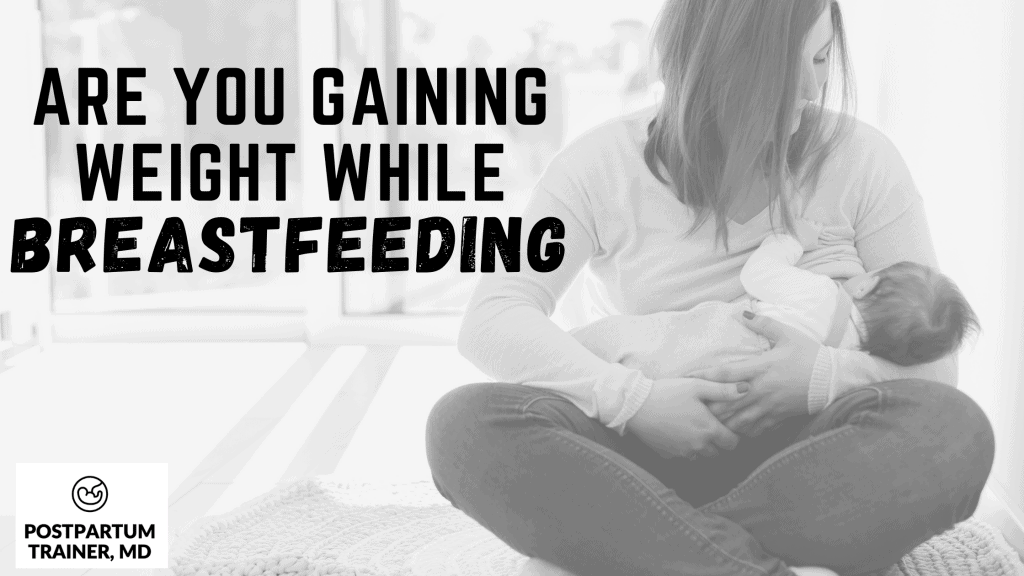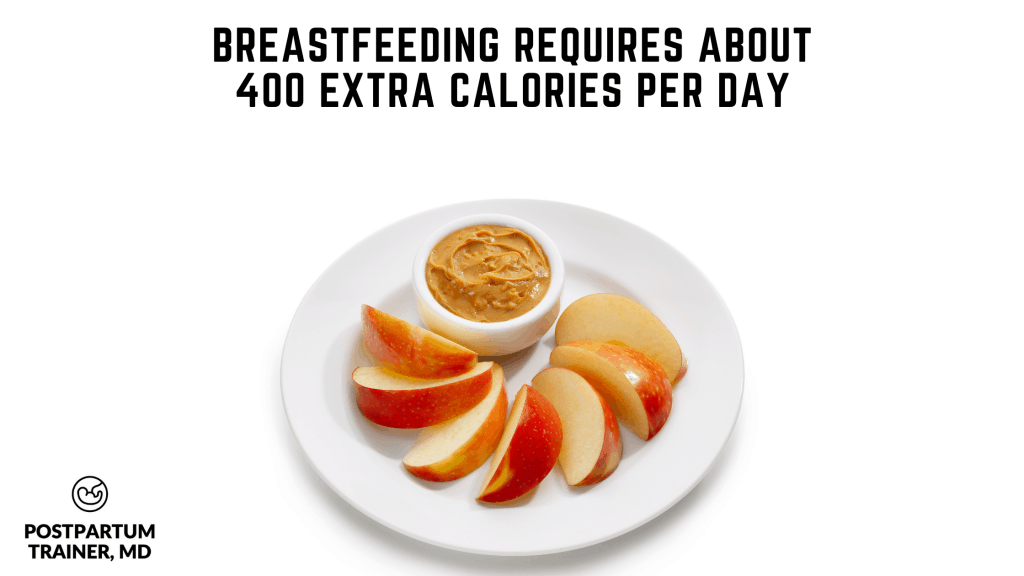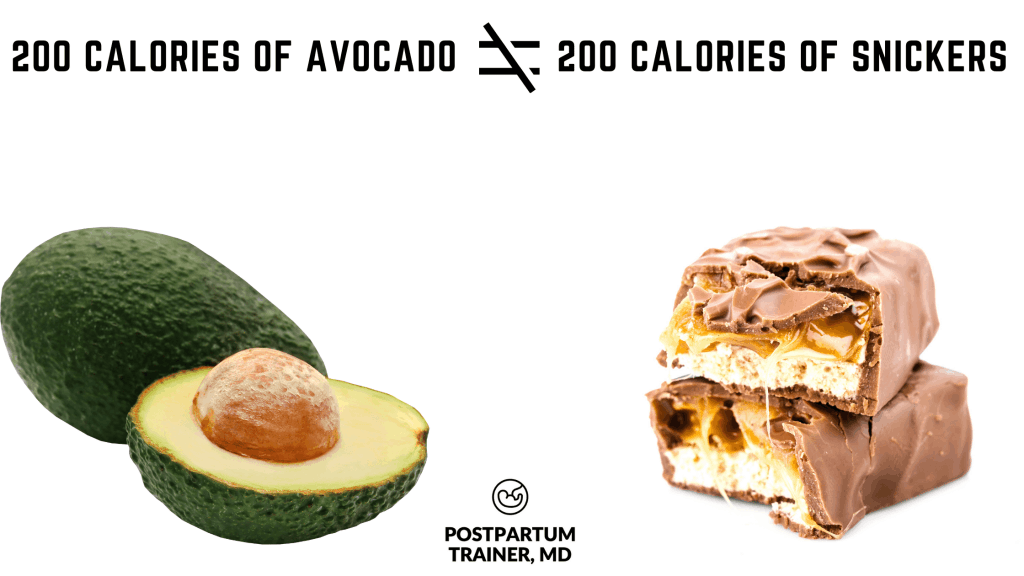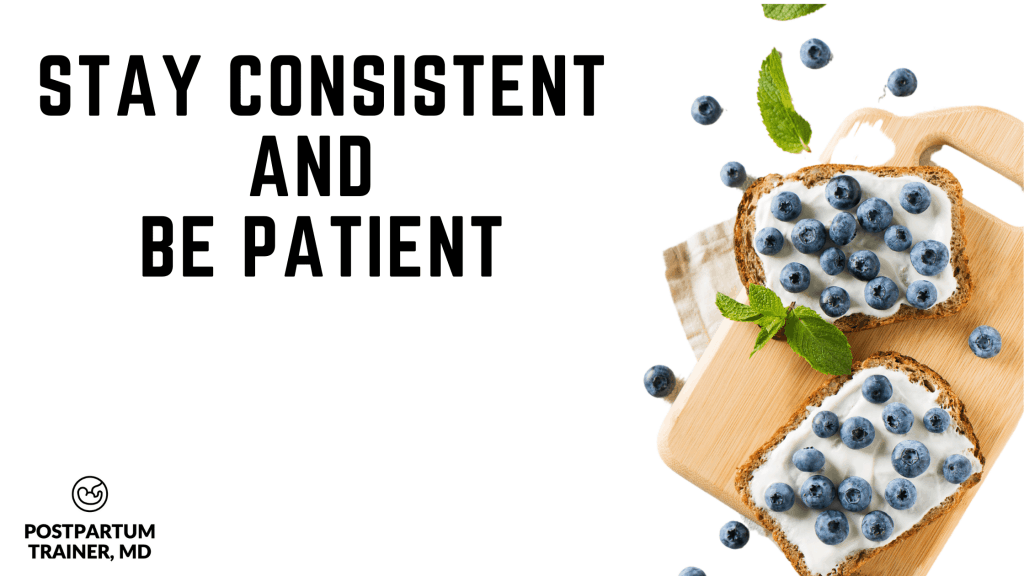Have you been gaining weight while breastfeeding when you were expecting to lose weight?
You’re in the right place.
In this post you’ll learn:
- Reasons why you might be gaining weight while breastfeeding,
- What to do to avoid putting on extra pounds, and
- A few strategies to help you lose the unwanted baby weight.
Let’s get started.

Why am I putting on weight while breastfeeding?
Weight gain while breastfeeding can happen due to a combination of factors such as:
- the total number of calories you are consuming,
- the actual foods you are consuming,
- your metabolic rate, and
- and your cortisol levels.
When you are postpartum, your body goes through several hormonal changes that can impact your hunger and the way your body processes energy.
In addition, the lack of sleep and the added stress of a newborn are enough to further increase your risk of weight gain.
I’ll go over each factor in more detail later on.
Can breastfeeding make you Put On weight?
Breastfeeding alone does not make you gain weight.
Weight gain while nursing is caused by consuming more calories than your body burns throughout the day.
If you eat 2500 calories, but your body only needs 1800 calories to survive and produce breast milk, those extra calories may be stored in the form of fat.
The problem is, breastfeeding can make you feel hungrier than usual, increasing your risk of overeating.
However, if you feel that you are gaining weight at an excessive rate, make sure to see your healthcare provider!
Does breastfeeding Cause You To Retain Weight?
No, breastfeeding by itself does not cause your body to store fat.
In contrast, breastfeeding actually burns calories, as energy is required to produce and let down your milk supply.
In fact, one large study found a significantly decreased risk of postpartum weight retention in women who breast fed their babies for at least 6 months.
So breastfeeding can help you lose weight!
With that said, consuming too much of the wrong type of calories can cause you to retain or even gain weight.
When do you start losing weight from breastfeeding?
You can begin losing weight from breastfeeding as early as 4-6 weeks provided you are maintaining a healthy intake of calories, nutrients, and water.
However, if you are overeating calories and unhealthy foods, you likely will not lose weight.
How can I avoid gaining weight while breastfeeding?
To avoid gaining weight while breastfeeding it is important to understand the the quantity and quality of the calories you are consuming on a daily basis.
How many calories are you eating each day?
Where are these calories coming from?
You must be true to yourself and answer these questions honestly.
Remember as a nursing mom, you only require an additional 400 calories per day on average.
This is about the equivalent of one healthy postpartum snack.
In addition, how many liquid calories are you drinking? One simple thing you can do is eliminate all non-water beverages and replace them with water!
You were never eating for two during the pregnancy and shouldn’t eat for two while breastfeeding.

Why can’t I lose weight while breastfeeding?
Losing weight while breastfeeding can be difficult because breastfeeding (and being postpartum) can be a very stressful time for you.
As a result, high levels of stress + the stress of breastfeeding can paradoxically increase your risk of weight gain instead of weight loss.
Let me explain why.
When your stress level is high, your adrenal glands ramp up the production of cortisol – aka the stress hormone.
Unfortunately, this isn’t a good thing.
There is plenty of evidence to show that cortisol can negatively impact your ability to lose weight.
That’s because high levels of stress can:
- increase grhelin (the appetite stimulating hormone),
- increase food cravings, and
- increase your risk of obesity
Knowing this, it is important to be mindful of what you are eating, especially during periods of high stress.
Otherwise, here are two strategies you can use to try and manage stress levels after baby.
2 Simple Strategies For Reducing Cortisol
The absolute best way to improve your cortisol levels is to try and maximize your sleep quality.
Your body interprets poor sleep, as a “fight or flight” event. Thus, a sleep deprived state is the same as a constantly “stressed” state.
I know that you have a new baby, and improving the number of hours you sleep is close to impossible. Instead, try to focus on the quality of sleep you are getting.
To improve the quality of your sleep, you can try the following:
- Sleeping in a very dark room,
- Not using your cell phone in your bed,
- Keeping your room cool,
- Taking the TV out of your bedroom, and
- Taking a warm shower before bed.
The second thing I want to talk to you about is your activity level.
As a breastfeeding mom you should not be sitting down all day.
You must move in between feeds.
Some type of physical activity is important. Especially for recovery and stress management!
But it is important to not over do it.
Check out my postpartum fitness posts to learn safe and healthy ways to exercise while breastfeeding.
What is the fastest way to lose weight while breastfeeding?
The fastest way to lose weight while breastfeeding is to consume fewer calories than your body burns and improve the quality of the foods you are eating.
The Calorie Deficit
Let’s start with consuming fewer calories.
This is also known as a caloric deficit.
First, you must look at what you eat on a daily basis to get a rough idea of how many calories you are eating per day.
The good news is- this is not difficult to do.
You can use an app such as myfitnesspal.com which makes this process pretty easy.
If that doesn’t work for you, check out this simple calculator I have created to help you determine how many calories you need to consume to lose weight while breastfeeding.
| ((Body Weight (lbs) x 13) + 400) – 250 |
Let me explain what it means:
- The first thing is to determine how much you weigh in pounds. I recommend checking first thing in the morning before breakfast and after you urinate/poop.
- Next, multiply your body weight by 12-14 to determine how many calories you need just to maintain your current body weight.
- Then, add about 400 calories to that number as you are breastfeeding.
- Finally, if your goal is to lose weight, you will need to create a modest caloric deficit of about 250 calories.
This is your new recommended daily calorie intake.
By consuming this lower number of daily calories you may start to lose weight in about 2 weeks.
If you fail to achieve any weight loss with this deficit, try decreasing your total calories by another 100-150 calories per day.
Make sure you stay consistent and remain patient.
The Quality of Your Food
While many people argue that a calorie is just a calorie, you can’t deny the fact that certain foods will make you feel differently in terms of energy, hunger, and mood.
A calorie isn’t just a calorie.
For example, 200 calories from an avocado are not equal to 200 calories from a snickers bar.

Or a more extreme example, drinking 2 tablespoons of vegetable oil (240 calories) will not have the same impact on your body as eating 240 calories of steamed vegetables.
Which one has more nutrients?
Which one will fill you up more?
If you are eating highly processed, nutrient-poor foods while breastfeeding, you will find it difficult to lose weight.
Try to make sure that you eat as many nutrient-dense foods as possible (such as fruits, vegetables, whole grains, and lean protein).
To get more information, check out How to Lose Weight While Breastfeeding.
Why do I feel so hungry while breastfeeding?
The reason you feel so hungry while breastfeeding is because your body is undergoing several hormonal changes that can affect your appetite.
Specifically, your body is secreting high levels of prolactin, cortisol, and grehlin, while suppressing the hormone adiponectin (which regulates metabolism and insulin sensitivity).
Let me explain in more detail.
1. Prolactin stimulates your appetite
Prolactin is a hormone that is secreted by your pituitary gland to allow for milk production. The name says it all. “Pro” (for) “lactin” (lactation).
What you may not know is that this hormone also stimulates your appetite.
So, it is quite common for you to experience increased hunger signals while you are breastfeeding.
But that’s not the only thing prolactin does. Studies have also shown that prolactin in breastfeeding women can suppress adiponectin levels.
2. The role of adiponectin
Adiponectin is a hormone secreted by your adipocytes (fat cells) and plays a role in glucose and lipid metabolism.
In other words, adiponectin is good for you.
Unfortunately, low adiponectin levels are associated with insulin resistance, obesity, and decreased metabolism- three things that can increase your hunger and cause increased fat accumulation.
3. You are burning calories
Another reason why you’re hungry while nursing is because breastfeeding burns calories!
The number of calories burned depends on a few factors like the number of times per day you are breastfeeding and the duration.
The more feeds you do, the more calories you will burn.
On average, you can expect to burn 300-500 calories per day while breastfeeding.
4. You are exhausted
Sleep deprivation is serious.
Aside from fatigue, a lack of sleep could lead to many hormonal imbalances that can affect your body weight.
In particular, ghrelin and leptin are two major hormones that are affected by sleep deprivation.
Ghrelin sends signals to your body letting you know you are hungry while leptin sends signals to your body letting you know you are full/satiated.
This explains why we always tend to eat late at night when we should be sleeping.
So as you can see, there are several factors that can impact your appetite while breastfeeding.
Other Related Questions
Why am I gaining weight while breastfeeding and exercising?
Exercise is a great way to improve your physical health while breastfeeding, but it may not be enough to prevent weight gain.
Both breastfeeding and exercise will help you burn calories, but if you aren’t careful, you can easily erase your efforts by overeating.
Your food intake will always be the most important factor in weight gain.
In addition, excessive exercise, coupled with breastfeeding, and being postpartum is a major stressor to the body.
Be gentle with yourself and most of all, it is important to take care of yourself!

Will I lose weight after I stop breastfeeding?
You may or may not lose weight after you stop breastfeeding.
It will largely depend on the the quantity and quality of the calories you are consuming.
With that said, many women will lose weight after they stop breastfeeding as your body won’t need extra energy to keep up with the milk supply.
However, if you continue to overeat low quality calories, you will not lose the extra weight.
What foods should breastfeeding moms avoid?
Breastfeeding moms should avoid:
- Excessive caffeine (caffeine can pass into your breast milk)
- Alcohol (for obvious reasons)
- High mercury fish (tuna, swordfish, tilefish)
- High amounts of nutrient-poor foods (soda, chips, pastries, ice cream)
What diet should a breastfeeding mother eat?
As a breastfeeding mother, you should try to consume a well-balanced unrestrictive diet that has adequate amounts of lean proteins, healthy fats, fiber, fruits, and veggies
I go over my recommended breastfeeding diet in this post!
How do you lose belly fat while breastfeeding?
Unfortunately there is no proven way to specifically reduce belly fat while breastfeeding.
For many new moms, the belly is the last place to lose weight from.
What you can do is follow a breastfeeding meal plan that is designed for women just like you coupled with the best exercises to strengthen your abdominal area.
Final Words on Gaining Weight While Breastfeeding
So there you have it.
You now know why you are gaining weight while breastfeeding.
Are you ready to turn things around?
The beauty of life is you can change anything around, immediately.
You just need the courage and willpower to do it.
So what do you say? Are you ready to track your caloric intake?
Comment below and let me know what you think.
Related Articles on Nursing and Weight Gain
- An Easy Postpartum Diet for Busy Moms [What You Should Eat]
- How To Lose Weight While Breastfeeding [Everything You Need to Know]
- Postpartum Weight Loss Timeline [Realstic Expectations For Losing Pregnancy Weight]
Get Four Free Workouts To Help Strengthen Your Pelvic Floor & Heal Your Mommy Tummy!

Brittany Robles, MD, MPH, CPT
Brittany Robles is a full-time OBGYN physician, a NASM certified trainer, and a prenatal and postnatal fitness specialist. She holds a Master of Public Health degree in maternal health with a special interest in exercise and nutrition. She is also the co-author of The White Coat Trainer. Learn more about her here.
Sharing is Caring – Send This To A Mom In Need!
References:
- Baker JL, Gamborg M, Heitmann BL, Lissner L, Sørensen TI, Rasmussen KM. Breastfeeding reduces postpartum weight retention. Am J Clin Nutr. 2008 Dec;88(6):1543-51. doi: 10.3945/ajcn.2008.26379. PMID: 19064514.
- Nilsson L, Binart N, Bohlooly-Y M, Bramnert M, Egecioglu E, Kindblom J, Kelly PA, Kopchick JJ, Ormandy CJ, Ling C, Billig H. Prolactin and growth hormone regulate adiponectin secretion and receptor expression in adipose tissue. Biochem Biophys Res Commun. 2005 Jun 17;331(4):1120-6. doi: 10.1016/j.bbrc.2005.04.026. PMID: 15882993.
- Asai-Sato M, Okamoto M, Endo M, Yoshida H, Murase M, Ikeda M, Sakakibara H, Takahashi T, Hirahara F. Hypoadiponectinemia in lean lactating women: Prolactin inhibits adiponectin secretion from human adipocytes. Endocr J. 2006 Aug;53(4):555-62. doi: 10.1507/endocrj.k06-026. Epub 2006 Jul 19. PMID: 16849835.
- Taheri S, Lin L, Austin D, Young T, Mignot E. Short sleep duration is associated with reduced leptin, elevated ghrelin, and increased body mass index. PLoS Med. 2004;1(3):e62. doi:10.1371/journal.pmed.0010062
- Chao AM, Jastreboff AM, White MA, Grilo CM, Sinha R. Stress, cortisol, and other appetite-related hormones: Prospective prediction of 6-month changes in food cravings and weight. Obesity (Silver Spring). 2017;25(4):713-720. doi:10.1002/oby.21790
- Hewagalamulage SD, Lee TK, Clarke IJ, Henry BA. Stress, cortisol, and obesity: a role for cortisol responsiveness in identifying individuals prone to obesity. Domest Anim Endocrinol. 2016 Jul;56 Suppl:S112-20. doi: 10.1016/j.domaniend.2016.03.004. Epub 2016 Mar 31. PMID: 27345309.

Omg this is the most amazing article on weight loss and breastfeeding!!! Thank you !!!!!!
Hi Jess,
Thank you so much for you comment!!
I am glad you have found this article helpful 🙂
Hello Dr Brittany,
Thank you so much for this article.
I have been breastfeeding for the last 7 months and gaining weight at a fast rate. I used to be slim ( BMI 23) and only gained 20 lb through the pregnancy. Breastfeeding has made me gained weight extremely (BMI 27). My food intake before pregnancy did not change. My metabolism was just very high back then. I am wondering if my adiponectin was highly suppressed by prolactin since my milk production during my first 4 weeks postpatrum was very low and I kept trying till the supply became abundant. If that’s the case is there anything I can do? Will my adiponectin come back to normal when I stop breastfeeding? Thanks.
Hi Mimi,
Thank you so much for your comment.
It is hard to know what your adiponectin levels were, and what they will be when you stop breastfeeding.
I would suggest you continue to focus on the things that are in your control i.e improving your nutrition as best as you can, increasing your water intake, and engaging in some sort of exercise routine.
Good luck!
Hi,
Thank you for this article. I am 9 weeks postpartum and have gained nearly a stone since my elective c section. I wasn’t this heavy when I had the baby and clearly I am consuming way to much. I have used your formula above and the calories I should be consuming seems quite high, especially for my height. I am 5ft1 and weigh 175lbs and the calories according to your formula is 2,425. Will this help me to lose weight? Or will I carry on gaining? MyFitnessPal doesn’t take into account breastfeeding.
Thank you 🙂
Hi Ranu,
Thank you so much for your comment and I totally understand your concern.
The formulas described in this article are rough guidelines.
With that said, they will be accurate for some and not so accurate for others. I recommend you use the calculated calories of 2,425 as a starting point and make adjustments as needed.
Ensure that you are also drinking enough water and staying away from consuming drinks with a ton of empty calories.
Hello Dr!
This article is exactly what I wanted to hear! So I skip meals, which I know is bad but I don’t feel hungry. But I’m gaining weight while breastfeeding I also take anxiety medication which keeps my cortisol level normal. I have two kids under two, so lots of activity. I sleep 6 hours straight which I believe is enough. I drink lots of water because breastfeeding makes me thirsty. My baby is 6 months now and I will continue to breastfeed her till 2 years. So where am I wrong? I had C-section, my height is 5 ft 2 inches and I weight 70 kg
Hi Irsa,
Thank you so much for your comment.
The weight gain is likely due to the foods you are consuming.
I would recommend tracking the food you are eating using an app like MyFitnessPal to determine how many calories you are consuming as well as the macronutrient content of the food.
Hope this helps!